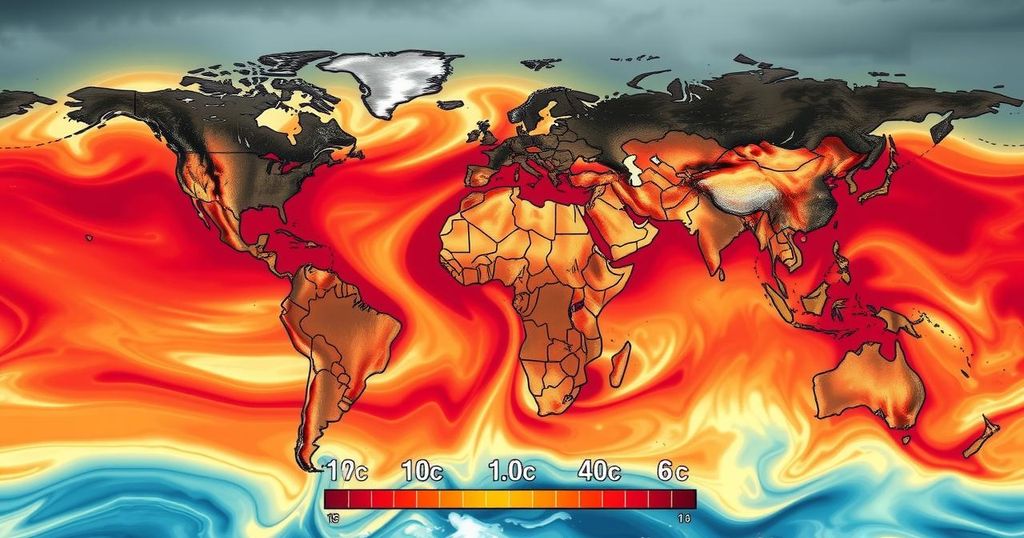2024 Marks First Year with Global Temperatures Exceeding 1.5°C

2024 has been identified as the first complete year with global temperatures surpassing 1.5 degrees Celsius above pre-industrial levels, according to climatologists. Monthly records indicate every month was among the warmest on record, reiterating the severity of climate change. The ramifications of these temperature rises are being felt globally, with extreme weather events causing loss of life and property. Experts are calling for immediate and unified action to combat rising greenhouse gas emissions and adhere to international climate agreements.
In a significant climate milestone, scientists have confirmed that the year 2024 marked the first complete year where global temperatures exceeded 1.5 degrees Celsius above pre-industrial levels. Data from the European Union’s Copernicus Climate Change Service (C3S) indicates that this alarming trend reflects unprecedented temperature rises due to climate change, with every month in 2024 recorded as the warmest or second warmest since modern records began. The average temperature for the year was reported at 1.6 degrees Celsius higher than the 1850-1900 baseline, underscoring the critical situation surrounding climate change.
Last year also set a record as the hottest year documented, following a pattern where each of the previous ten years ranked among the ten warmest on record. While the UK’s Met Office estimated a slightly lower average temperature of 1.53 degrees Celsius, it aligns with the ongoing trend emphasizing the urgency of addressing climate change. According to Carlo Buontempo, Director of C3S, rising greenhouse gas emissions pose a continuing threat of surpassing the Paris Agreement’s temperature thresholds, promoting a plea for immediate action to mitigate these emissions and potentially alter the damaging trajectory of climate change.
Globally, climate change is resulting in severe and visible impacts, exacerbating weather events such as wildfires, floods, and heatwaves that have inflicted significant damage in various regions, including the recent wildfires in California and catastrophic conditions in Bolivia, Venezuela, and several countries facing unprecedented floods. The increased atmospheric water vapor, noted to have reached record highs in 2024, contributes to severe weather and rainfall patterns.
Political will to combat climate change appears to be waning in parts of the world, particularly with new leadership in the United States expressing skepticism about climate science. This reluctance comes at a time when the country experienced considerable costs from climate disasters in 2024 alone, which exceeded one billion dollars for multiple events, including Hurricane Milton.
Climate experts stress the urgency for collective global action to meet carbon reduction targets while recognizing the ongoing rise in carbon dioxide levels, which reached a staggering 422 parts per million in 2024. Zeke Hausfather, a research scientist, predicts that while 2025 may still rank among the hottest years on record, it is essential to address the human causes of climate change and adapt to shifting climatic conditions caused by phenomena such as El Nino.
Chukwumerije Okereke, a professor at the University of Bristol, emphasized the importance of the 1.5 degrees Celsius milestone as a stark wake-up call for policymakers to adhere strictly to their climate commitments. This ongoing crisis demands increased investment and serious commitment to curbing emissions across all sectors.
The alarming rise in global temperatures is attributed to human activities, particularly the burning of fossil fuels that emit greenhouse gases. Since the industrial revolution, the Earth’s climate has undergone significant changes, with scientists warning of catastrophic consequences if average global temperatures continue to rise beyond 1.5 degrees Celsius, a threshold established in the 2015 Paris Agreement to avert severe climate impacts. Events such as wildfires, floods, and extreme weather patterns are becoming increasingly common, underscoring the urgent need for global action to mitigate climate change.
The confirmation of 2024 as the first full year exceeding 1.5C of temperature rise emphasizes a critical juncture in the fight against climate change. Immediate actions to reduce greenhouse gas emissions are imperative to avert further climatic disasters. As the signs of climate change become increasingly dire, global leaders must respond with courageous and substantial policy changes while remaining accountable to international climate agreements. Without decisive action, the world’s trajectory appears set for worsening environmental conditions, making it crucial for nations to collaborate transparently and effectively in addressing these challenges.
Original Source: www.straitstimes.com






